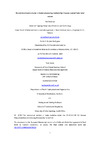Please use this identifier to cite or link to this item:
https://accedacris.ulpgc.es/jspui/handle/10553/52358
| DC Field | Value | Language |
|---|---|---|
| dc.contributor.author | Chun-Lai, Pei | en_US |
| dc.contributor.author | Espino-Rodríguez, Tomás F. | en_US |
| dc.contributor.author | Baum, Tom | en_US |
| dc.date.accessioned | 2018-11-25T19:38:47Z | - |
| dc.date.available | 2018-11-25T19:38:47Z | - |
| dc.date.issued | 2019 | en_US |
| dc.identifier.issn | 1354-8166 | en_US |
| dc.identifier.other | WoS | - |
| dc.identifier.uri | https://accedacris.ulpgc.es/handle/10553/52358 | - |
| dc.description.abstract | The study examines relational norms in outsourcing relationships. The study analyzes some factors that determine the use of relational norms, such as outsourcing benefits and the competitive strategy (cost leadership and differentiation). In addition, it analyzes the influence of the use of relational norms on the outsourcing success. Based on a sample of 127 outsourcing relationships in two tourist destinations, a partial least squares structural model was used to test the hypotheses. The findings show that the outsourcing benefits and competitive strategy determine the use of relational norms. They also show that there is a positive relationship between relational norms and outsourcing success. Some differences were found between the two destinations analyzed. | en_US |
| dc.language | eng | en_US |
| dc.publisher | 1354-8166 | - |
| dc.relation.ispartof | Tourism Economics | en_US |
| dc.source | Tourism Economics[ISSN 1354-8166],v. 25 (2), p. 189-212 | en_US |
| dc.subject | 531290 Economía sectorial: turismo | en_US |
| dc.title | Do relational norms matter in outsourcing relationships? Lesson learned from hotel sectors | en_US |
| dc.type | info:eu-repo/semantics/article | en_US |
| dc.type | Article | en_US |
| dc.identifier.doi | 10.1177/1354816618794553 | en_US |
| dc.identifier.scopus | 85053378220 | - |
| dc.identifier.isi | 000458865500003 | - |
| dc.contributor.authorscopusid | 57192006881 | - |
| dc.contributor.authorscopusid | 8582478200 | - |
| dc.contributor.authorscopusid | 7102086841 | - |
| dc.identifier.eissn | 2044-0375 | - |
| dc.description.lastpage | 212 | en_US |
| dc.identifier.issue | 2 | - |
| dc.description.firstpage | 189 | en_US |
| dc.relation.volume | 25 | en_US |
| dc.investigacion | Ciencias Sociales y Jurídicas | en_US |
| dc.type2 | Artículo | en_US |
| dc.contributor.daisngid | 24163337 | - |
| dc.contributor.daisngid | 1702354 | - |
| dc.contributor.daisngid | 417645 | - |
| dc.description.numberofpages | 24 | en_US |
| dc.utils.revision | Sí | en_US |
| dc.contributor.wosstandard | WOS:Chun-Lai, P | - |
| dc.contributor.wosstandard | WOS:Espino-Rodriguez, TF | - |
| dc.contributor.wosstandard | WOS:Baum, T | - |
| dc.identifier.ulpgc | Sí | en_US |
| dc.contributor.buulpgc | BU-ECO | en_US |
| dc.description.sjr | 0,611 | |
| dc.description.jcr | 1819,0 | |
| dc.description.sjrq | Q1 | |
| dc.description.jcrq | Q2 | |
| dc.description.ssci | SSCI | |
| item.grantfulltext | open | - |
| item.fulltext | Con texto completo | - |
| crisitem.author.dept | GIR IUCES: Estrategia y Negocios Internacionales | - |
| crisitem.author.dept | IU de Cibernética, Empresa y Sociedad | - |
| crisitem.author.dept | Departamento de Economía y Dirección de Empresas | - |
| crisitem.author.orcid | 0000-0002-4292-504X | - |
| crisitem.author.parentorg | IU de Cibernética, Empresa y Sociedad | - |
| crisitem.author.fullName | Espino Rodríguez, Tomás Francisco | - |
| Appears in Collections: | Artículos | |
SCOPUSTM
Citations
8
checked on Jun 8, 2025
WEB OF SCIENCETM
Citations
7
checked on Feb 15, 2026
Page view(s)
53
checked on Jan 11, 2026
Google ScholarTM
Check
Altmetric
Share
Export metadata
Items in accedaCRIS are protected by copyright, with all rights reserved, unless otherwise indicated.
